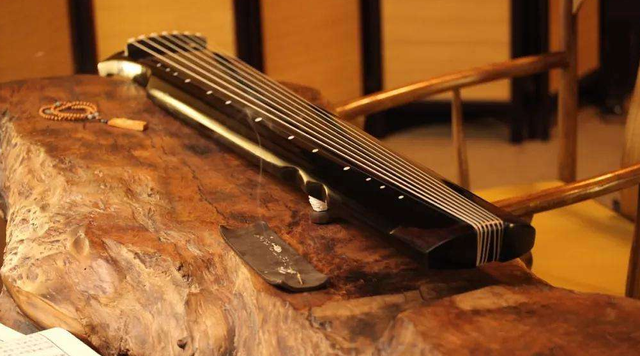Anecdotes of Guqin Celebrities: The Story of Tao Yuanming and Guqin
Celebrity anecdotes often produce many different texts in the process of circulation, and even become unrecognizable due to excessive interpretation. An obvious example is Tao Yuanming's stringless qin. Shen Yue's "Song Shu: Yin Yi Biography" first recorded this matter: "Qian can't understand the sound, but there is a husuqin without strings.
Whenever the wine is suitable, noir caresses to send its meaning. Later, Xiao Tong said more clearly in "The Biography of Tao Yuanming": "Yuanming does not understand the rhythm, but has a stringless qin. "The Book of Jin, Yinyi Biography" written by Tang Xiu said it more vividly: "The nature is not deciphered, and there is one animal qin, and no string emblem.
Every time a friend had a wine meeting, he would comfort him and say: 'But if you know the fun of the qin, why bother to tune it! '" Since then, the family storage of the stringless qin has become one of Tao Yuanming's most famous anecdotes.
If Li Bai's "Peng Zeyi has no strings" ("Gifts to Zheng Liyang") is just a direct account of the matter, then Huang Tingjian's "Peng Ze's meaning is without strings" ("Gifts to Gao Zimian") is an interpretation that seeks meaning. Huang Tingjian even believed that the stringless qin had a higher value: "If you want to keep your lord to drink under the jurisdiction of Chen Zun, it is better to give your lord a violin without strings. After the wine is disgusting, the wind blows and wakes up, and the qin only has no strings. !"
("Send to Chenxiao County") What's more, it is like Zhang Sui's "Fu Xian Qin Fu" of the Tang Dynasty, which not only said that Tao Yuanming "made the empty utensils to get it, and left the complicated strings to the Taoist propaganda", but also pretended to be Tao Yuanming's mouth. Claimed: "Music is silent and love is more than doubled, and the qin has no strings and is full of meaning. Heaven and earth are in harmony and there is a real slaughter.
In modern times, scholars have been proving the great significance of the stringless qin at length. recognize. However, is this the truth of the matter?

First of all, Tao Yuanming is not "incomprehensible". Tao Yuanming loves music. Like reading and drinking, playing the piano is also a great pleasure in his life. This is evidenced by its poems: "The weak age is sent to other affairs, and the entrustment is in the book of the qin." ("The first song of the town to join the army") "The qin is on the horizontal bed, and the turbid wine is half a pot." ("Fortune") "Under Hengmen, there are pianos and books.
Loaded with bombs and chants, I am entertained. ("Answer to Pang Joining the Army") "The love words of the relatives, the music of the qin book to relieve worries. "("Returning and Coming") "Xin Yi Su Su and Harmony Yi Qi Xian. ("Self-Sacrifice") What reason is there to say that he "doesn't understand the sound"? And in the last example, it clearly mentioned "seven strings", so how could it be a stringless piano?
Secondly, Tao Yuanming's greatest characteristic as a person is his sincerity, and there is no pretense or pretense in his behavior throughout his life. As Su Dongpo said: "Tao Yuanming wants to be an official, and he doesn't take it as a disgust. If he wants to hide, he hides, and he doesn't want to go. If he is hungry, he will knock the door and beg for food.
The ancient and the modern are wise, and the truth is precious. "("After Li Jianfu's Poems") It is hard for me to imagine that Tao Yuanming would deliberately buy a stringless qin. A person deliberately holds a stringless qin to play with, and that kind of "behavior show" that pretends to be a ghost is probably only in modern times. The "performance artist" can only come up with it, we can't slander the ancients.
So, what happened to Tao Yuanming's stringless qin? Are the records in the Book of Songs and other classics all created out of nothing? I think Su Dongpo explained it best: "Yuan Ming said from himself that 'harmony with the seven strings', how could he not know the sound.
When there is a qin and the strings are bad, it will not be changed anymore, but it is stroking to express its meaning, so it is true. "("Yuanming Without Strings") Indeed, Tao Yuanming's family was poor, with poor food and clothing, and it was reasonable that he could not replace the strings when the strings were broken.
The strings were broken, and when there was something in his heart that he needed to express, he hugged the stringless qin and stroked it. As long as there was a melody in his heart, it didn't matter if there was a melody in his heart. This is a natural, honest, uncontrived behavior. Some people may have seen this scene without knowing its meaning. After several legends, it has become a record in the "Song Book".
 渝公网安备 50010702504639号
渝公网安备 50010702504639号